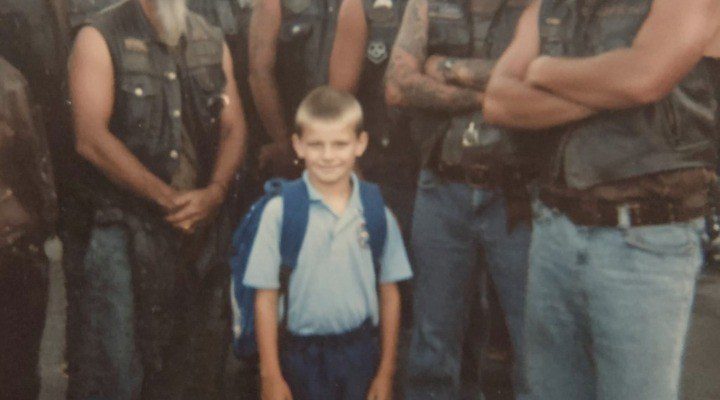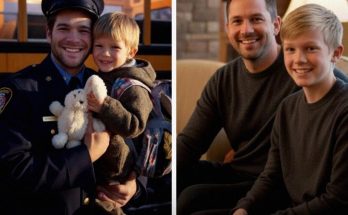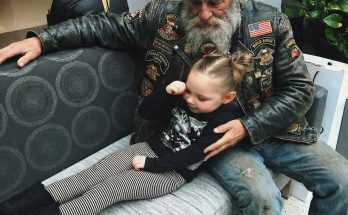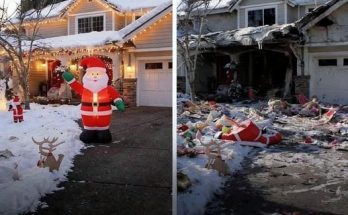When Marcus walked into our clubhouse clutching his piggy bank, we all thought it was some kind of joke. A nine-year-old boy, bruised and trembling, asking if we were “the kind of bikers who protect people like on TV.”
His lip was split, his eye swollen purple. He shook so badly he could barely spill his coins and wrinkled bills onto our poker table.
At first, none of us knew what to say. We were used to grown men asking for protection, not a little kid. But then Marcus explained why he was there, and every hardened man in that room—guys who’d survived prison, combat, and street wars—felt their throats tighten with anger.
“They hurt Sarah,” he whispered. “She has Down syndrome. They pushed her wheelchair down the stairs. When I told the teacher, she just said ‘boys will be boys.’ Now those kids said they’re gonna beat me up after school tomorrow for being a snitch.”
Seventeen bikers fell silent.
Marcus had placed seven crumpled dollars on the table. Our daily rate was five hundred per man—seven dollars wasn’t even enough for one of us to sit on a bike for five minutes.
Big Mike, our club president, picked up the money and studied it. “Kid,” he said gently, “we can’t—”
“Please,” Marcus broke in, fresh tears streaking down his face. “My mom works two jobs. My dad’s gone. I don’t got anybody else. Sarah’s my friend. She can’t even walk, and they hurt her. Nobody cares. I’m scared, but I can’t just do nothing.”
That was the moment something shifted in all of us. A child had brought his entire life savings to beg strangers for help—because every adult in his world had failed him.
Mike’s voice hardened. “This is more than enough. We’ll take the job. What time does school get out?”
Marcus blinked in disbelief. “Three o’clock. They said they’d get me in the parking lot.”
Mike scribbled on a scrap of paper and handed it to him. “Security Services—Paid in Full.”
The next day at 2:45, the rumble of seventeen Harleys echoed across the street from Riverside Elementary. Teachers and kids pressed against the windows as we lined up our bikes in front of the main entrance, leather vests shining, arms crossed.
When the bell rang, children poured out. We spotted Marcus walking beside a woman pushing Sarah’s wheelchair—her arm in a fresh cast. Right behind them came six bigger boys, led by one who looked twice Marcus’s size. Tommy Jenkins.
They froze the second they saw us.
“Marcus!” Mike called out. “That you?”
Marcus’s face lit up. “You came!”
“Course we did. We keep our word.” Mike turned to the bullies. “These the boys?”
“Yes sir.”
Mike strode toward them, the rest of us behind him like a wall. Tommy tried to hold his ground, but his friends melted into the crowd.
“You Tommy?” Mike asked.
The boy nodded, his bravado already cracking.
“I hear you like pushing girls in wheelchairs down the stairs.”
Tommy stammered, “It was an accident!”
“Funny,” Mike replied calmly. “Everyone says you laughed while she cried.”
A teacher rushed out, flustered. “You men can’t be here—this is school property!”
Mike’s eyes narrowed. “Are you the teacher who told Marcus ‘boys will be boys’ when he reported the attack?”
She paled. “I… it was handled—”
“Handled?” Mike’s voice cut like steel. “A child is in the hospital, and another was threatened for telling the truth. That’s not handled. That’s ignored.”
By now, a crowd had gathered. Parents. Teachers. Students. Then Tommy’s mother appeared.
“My son would never—” she began.
Mike held up his phone. On screen was footage from multiple students—Tommy and his gang tipping Sarah’s chair, laughing as she screamed.
Tommy’s mother turned white. Tommy stared at the ground.
“Here’s how it works,” Mike announced to everyone. “Marcus hired us. Every day at 3 o’clock, we’ll be here. We’ll walk him and Sarah home. No one touches them. The day the bullying stops, we stop. Simple as that.”
The principal tried to bluster, but by then parents were nodding. Kids were whispering. And Tommy? His reign ended that day.
For the next two weeks, we showed up daily. We never had to raise a hand—our engines and presence were enough. Soon other children approached us, sharing their own stories of bullying. Parents thanked us for listening.
That was the birth of Bikers Against Bullies.
What began with seven dollars turned into a nationwide nonprofit. Clubs from other states joined. We started speaking at schools, telling kids they weren’t alone. Teaching them that courage wasn’t about fists, but about standing up for what’s right.
Five years later, I saw Marcus again. Taller now, stronger, a teenager. He came up to me at a toy run and handed me a crumpled piece of paper.
The receipt. Security Services Paid in Full.
“I kept it,” he said. “It reminded me that seven dollars can change the world if you spend it on the right thing.”
Sarah wheeled up beside him, smiling. They were still best friends. They’d started a peer counseling group at their high school, named it ‘Seven Dollars.’
That day, I had to look away so no one saw me cry.
Because that’s the truth about bikers. People think we’re outlaws, but the reality is simpler. We show up when no one else will. We take a scared kid seriously. We stand between the weak and those who’d harm them.
And sometimes, the best money we ever earn is seven crumpled dollars from a child who just wanted to protect his friend.



